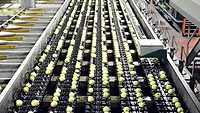Innovation in a Time of Crisis: Top Five Food Safety Takeaways from IFT FIRST

Image provided by IFT
Over 16,000 food industry professionals gathered in Chicago, Illinois in July to attend IFT FIRST (Food Improved by Research, Science, and Technology). The theme of this year's event, "Innovation in a Time of Crisis: Can We Future-Proof the Food System?" drew attendees from around the world for a future-focused discussion about the food system, with an emphasis on sustainability and resiliency.
The scientific program at IFT FIRST featured several food safety discussions around new challenges and key topics like chemical contaminants, consumer trust, standardization, FDA's traceability rule, and the co-management of food safety and sustainability. The top five takeaways from food safety programming at IFT FIRST are summarized below.
Takeaway 1: A Safe and Sustainable Future Calls for Creativity
The widespread adoption of pasteurization in the early 20th century revolutionized food safety. It remains a critical process today, ensuring the safety of plant and animal-based dairy products and fruit juices. However, the process is often energy intensive, prompting the need for creative solutions to reduce energy input while maintaining a safe output.
Perhaps even more important than energy conservation is water conservation. Water sits at the center of critical food production operations such as crop irrigation, equipment sanitation, food preparation, and cooking/cooling. With a growing strain on freshwater resources, reusing water is vital for sustainability, but it may increase the risk of pathogen contamination and foodborne illness. Innovative co-management solutions that address disinfection and detection are essential for safely optimizing water reuse.
No single solution will yield a sustainable food system. Rather, a collection of small, creative solutions is needed to tackle the multi-faceted issue of sustainability while prioritizing food safety.
Takeaway 2: Data Quality and Availability Remain Challenges
Looking for quick answers on food safety topics?
Try Ask FSM, our new smart AI search tool.
Ask FSM →
"Food safety starts with good data," remarked an attendee during a discussion about the growing concerns about heavy metals, "and there's a lack of good data, sometimes." One of the key challenges in assessing the risk of heavy metal contamination in produce is the lack of comprehensive data sets regarding existing levels. Data collection is not without cost, and factors like water sources, agricultural practices, and soil types further complicate the cultivation of useful data sets.
Data availability, or lack thereof, poses a similar challenge in the artificial intelligence (AI) space. Although industry actors are eager to apply AI and machine learning tools to food safety initiatives, these tools require a high volume of quality data for effective implementation.
Data quality has also gained regulatory prominence with the release of FDA's Final Food Traceability Rule, which requires industry actors to share traceability data through certain supply chains. Collecting data across the supply chain is a challenge, but ensuring the collection of accurate data can be even more difficult. Addressing all of these data challenges will be crucial for advancing food safety practices and securing consumer well-being.
Takeaway 3: Training is a Crucial Investment
Following the challenge of data quality, robust training emerges as a crucial investment. Despite the increase in data digitization, humans remain responsible for collecting and inputting much of the data that flows through our digital systems. No matter the data's purpose, proper training becomes imperative to ensure that the right data is collected, at the right time, and in the right place, paving the way for a more efficient and reliable food supply chain.
Not only does training foster quality data, but it also plays a vital role in risk management, especially in the realm of cybersecurity. Cyberattacks pose an emerging threat to food defense, with hackers targeting people as a point of vulnerability. Speaker Jennifer van de Ligt of ToxStrategies stressed the importance of fundamental training not only in basic hygiene but also in "cyber hygiene." Employees must be well versed in recognizing the risks and red flags of cybercrime, fortifying the industry against potential breaches that could compromise food safety and integrity.
Ensuring food safety throughout the supply chain requires active participation from every individual involved, making adequate training the linchpin for fulfilling their respective roles effectively.
Takeaway 4: Communication is Critical for Consumer Trust
Gaining and maintaining consumer trust has long been a priority for food industry actors. Panelists in several forums at IFT FIRST highlighted the challenge of establishing consumer trust and the critical role of communication in achieving it.
In the wake of rising recalls, timely and candid communication has become a significant factor in establishing trust. When delayed communication and action can result in consumer illness, speedy communication is appreciated, even if it is imperfect.
Tone is just as important as timeliness. "It's not about talking to, it's about talking with," remarked Kris Sollid of the International Food Information Council, emphasizing the fact that consumers need reminders that are engaging more than scolding. Although explaining the complexities of food safety and nutrition can be daunting, it is unhelpful to simply demand that consumers trust the science that backs our food system.
Contextual communication is a valuable tool in the science communications toolbox. For example, strawberries topped this year's Dirty Dozen list,1 indicating the highest pesticide residue levels among 46 produce items analyzed. The presence of a residue, however, does not necessarily indicate a public health risk. Providing concrete, contextual examples—such as the fact that an average adult woman could consume up to 453 strawberries per day without adverse effects from pesticide residue2—instills confidence in the safety of our food supply.
Food professionals must remain conscious of what they say, when they say it, and how they say it as they work to build trust among consumers.
Takeaway 5: Relationships are More Important than Ever
Collaboration once again emerges as a key theme, resonating in both last year's scientific program and this year's discussions at IFT FIRST.
Whether food industry actors are sharing data to achieve regulatory compliance or to cultivate robust data sets for analysis, data sharing must become common practice in the food safety space. The level of data exchange required will be challenging but vital in enhancing food safety, calling for a united effort from all involved stakeholders.
Amid ongoing supply chain disruptions that may exacerbate existing food safety risks, the need for active supplier relationships that allow for data-based monitoring and management is evident. Robust supplier data is key to assessing and mitigating product risk.
Standard-setting organizations like the Codex Alimentarius Commission rely on collaborative relationships between various actors worldwide including government, industry academia, and non-governmental organizations. As new food safety concerns emerge with the evolution of our food system, these interdisciplinary relationships help to secure a more secure and consistent food system on an international scale.
Be Part of Critical Conversations and Solutions at IFT FIRST 2024
Interested in connecting with food professionals together through big ideas, cutting-edge research, and lively discussion? Join IFT's community of food professionals and stay up to date for next year's event!3
References
- EWG Science Team. "EWG's 2023 Shopper's Guide to Pesticides in Produce." Environmental Working Group. March 15, 2023. https://www.ewg.org/foodnews/summary.php#summary.
- Safe Fruits and Veggies. "Calculate." Alliance for Food and Farming. 2023. https://www.safefruitsandveggies.com/calculate/.
- IFT FIRST. Institute of Food Technologists (IFT). https://www.iftevent.org.








